A student participating in the Summer Research Program – Aging & Neurological Diseases Track discusses her work with the Stark Lab at WashU.
The halfway point of an exciting summer
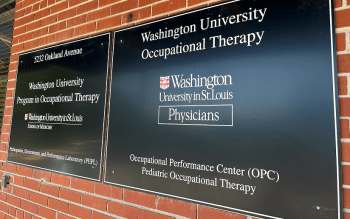
Harvey A. Friedman Center for Aging Blog Posts

A student participating in the Summer Research Program – Aging & Neurological Diseases Track discusses her work with the Stark Lab at WashU.

Read a reflection on aging in this blog post from a student in the Summer Research Program – Aging & Neurological Diseases Track.
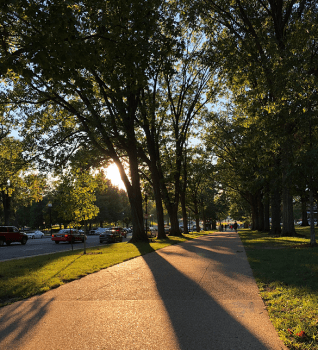
A Summer Research Program — Aging & Neurological Diseases Track student talks about his experience Empathetic Exercises, which simulate physical disabilities associated with aging.
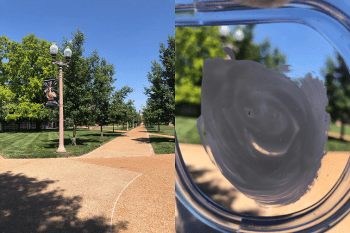
See through the eyes of an older adult with macular degeneration in this blog post by a participant in the Summer Research Program-Aging & Neurological Diseases Track.
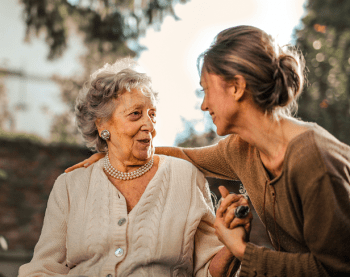
Learn about the documentary, The Alzheimer’s Project: The Memory Loss Tapes in this blog post by a student in the Summer Research Program-Aging & Neurological Diseases Track
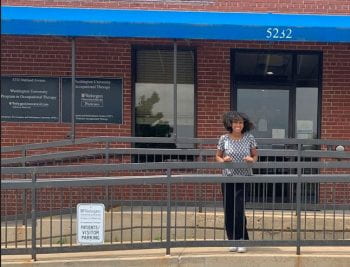
Find out what’s happening with students in the Summer Research Program-Aging & Neurological Diseases Track in this blog post from a participating student.
Read more about resources and tips for helping older adults celebrate Older Americans Month!
Careers in Aging Week, April 17-23 is designed to bring awareness to the wide-ranging career opportunities in the field of aging. Read one geroscientist’s point of view here.
Careers in Aging Week, April 17-23 is designed to bring awareness to the wide-ranging career opportunities in the field of aging. Read one professional’s point of view here.
Commemorating Careers in Aging week (April 17-23), read a blog post authored by WashU professor, David Balota working in aging research.
Careers in Aging Week, April 17-23 is designed to bring awareness to the wide-ranging career opportunities in the field of aging. Read one student’s point of view here.
In this blog post, Faculty Scholar and contributor to the Friedman Center for Aging, Brian Carpenter, asks some important questions about health care as we age.
Read this informative blog by Associate Professor, Karla Washington, also a 2022 Friedman Lecture & Awards’ panelist.
How we speak and write about aging matters. Learn more about what several national agencies say are best practices in eliminating age bias from written language.
Written by Chris Frey, LCSW, Your Next Move course instructor As an educator and counselor, my interest in how we navigate transitions of all shapes and sizes has grown significantly through the years. As I have aged, my journey to understand both the familiar and unique aspects of life changes that call on us to […]

Written by Morgan Van Vleck, MSW candidate (’22) and Masters Research Fellow in Aging at the Harvey A. Friedman Center for Aging As we become an increasingly aged society, it is important to understand how stereotypes and bias against both younger and older age groups functions and leads to fractures in intergenerational relationships. Ageism against […]

Written by Michele Dinman, project coordinator for the Harvey A. Friedman Center for Aging at the Institute for Public Health “She looks so good for her age”…“I was having a senior moment”…“50 is the new 30”…“Old people go there”….“You don’t look 70”… “Millennials have an inflated sense of entitlement” …“She is too young to be […]

Paresa Chowdhury, a Summer Research Program participant, discusses the insight she gained on aging and ageism while working in the PATH Lab.

Mateo Blair, a Summer Research Program- Aging and Neurological Diseases Track participant, discusses her experiences in Dr. Susan Stark’s lab.

In this blogpost written by Sophia Tu, a Summer Research Program student in the Aging & Neurological Diseases Track, studies concerning dementia and Alzheimers are discussed.

This blogpost written by Summer Research Program, Aging & Neurological Diseases Track student, Danielle Friz discusses various presentations on chronic diseases in aging adults.
This blog post by Summer Research Program student Aja Jones assesses the connection between healthy aging and a continuous development of an individual’s purpose for life.
In this blogpost written by Summer Research Program student, Josie Wright, the COMPASS program and home modifications for stroke patients are discussed.
The multidimensional affects of aging on our population is the topic of this blogpost by Summer Research Program student, Lindsey Debosik.
Guest author Behnaz Sarrami reviews area older adult service agencies and the need for a “voice” for adults as they age.
The Institute for Public Health & its Friedman Center for Aging welcome our new Project Coordinator, Michele Dinman.
Issues affecting older adults during the time of COVID-19 are the topic of this blogpost by guest author, Morgan Van Vleck, masters research fellow in aging.
Students in the class, When I’m 64, have developed a Lifespan Calculator. Learn more in this blog by guest author, Donna Springer.

Social media isn’t just for kids anymore. Older adults today are adeptly winding their way through the social sphere more than ever.

By Nancy Morrow-Howell, MSW, PhD, the Bettie Bofinger Brown Distinguished Professor of Social Policy, Brown School of Social Work and director of the Harvey A. Friedman Center for Aging On December 8, 2020, the first Pfizer Covid-19 vaccine went into the arm of a 90-year-old woman, Margaret Keenan, with the second delivered to an 81-year-old […]

Friedman Center for Aging “Your Next Move” Seminar Summary Written by Kim Furlow, Institute for Public Health Being in my early 50’s and thinking about “many years from now” when I’ll retire, (not really; it’s probably coming sooner than we all expect!) I decided to attend the Friedman Center for Aging “Your Next Move” Seminar […]

by Barbara L. Finch, MLA, Alumna, Washington University in St. Louis The older adults I know are scared. In the independent living retirement community where I live, eight months of isolation because of Covid-19 is beginning to take its toll. While we are no longer “locked down” like we were during the first few months of […]

Written by Mason Basler, BS candidate in biochemistry, Rockhurst University; participant in the Summer Research Program,- Aging and Neurological Diseases Track During the online summer internship in aging and neurological conditions, I attended an online presentation given by Brian Carpenter, PhD, who is a professor and researcher of psychological and brain sciences. During this presentation, […]

Written by Sophia Tu, BS candidate at Saint Louis University; participant in the Institute for Public Health Summer Research Program- Aging and Neurological Diseases Track I was sitting in front of my computer screen with the volume turned up, listening intently as the words coming through the speakers gave me goosebumps. Some nights I would catch […]
Written by Lindsey Debosik, B.S. candidate in Public Health and Health Management at Saint Louis University and participant in the 2020 Institute of Public Health Summer Research Program For the longest time, I did not understand the value of research to society or to oppressed individuals within that society. As a public health student, I […]

By Kyla Kikkawa, B.A. Candidate, Washington University in St. Louis Participant, Institute for Public Health Summer Research Program, Aging and Neurological Diseases Track As we concluded our virtual program, each of us were shown versions of our “older selves” created by a digital application, which would have been printed on our name placards had we […]

Written by Josie Wright, BA candidate in psychology at Southern Illinois University Edwardsville; participant in the Institute for Public Health Summer Research Program- Aging and Neurological Diseases Track The virtual Summer Research Program in Aging and Neurological Diseases was an amazing experience. I loved learning about everything we discussed throughout the program. I was especially […]

Written by Paresa Chowdhury, BS candidate in psychology at Loyola University Chicago; participant in the Institute for Public Health Summer Research Program– Aging and Neurological Diseases Track When the COVID-19 crisis struck our country, everything felt uncertain. I could only hope that things would take a turn for the best, whichever way they go. Luckily, […]

Written by Nahom Zewde, BA candidate at Earlham College, Indiana; participant in the Institute for Public Health Summer Research Program– Aging and Neurological Diseases Track I am currently a pre-medical student at Earlham College, studying Biochemistry and Mathematics. Alongside my academics, I am involved in many volunteering activities, at a skilled nursing facility and a […]
Written by Mateo Blair, B.A. candidate in Biochemistry at Washington University in St. Louis & participant in the 2020 Institute for Public Health Summer Research Program The Covid-19 pandemic has made the past couple of months hectic. before I got news that it would be entirely virtual this summer, the Summer Research Program – Aging […]

by Danielle Friz, BSN Candidate, ’21, University of Missouri – St. Louis; participant Institute for Public Health Summer Research Program- Aging and Neurological Diseases Track In a seminar led by Dr. Nancy Morrow-Howell, director of the Harvey A. Friedman Center for Aging, I was very interested to learn about how ageism has played such a […]

Written by Aja Jones, B.A. candidate in Psychological & Brain Sciences at Washington University in St. Louis & participant in the 2020 Institute for Public Health Summer Research Program In an online seminar for the summer program’s Aging and Neurological Diseases Track with Matthew Wynn, a graduate student focusing on Geropsychology, I was able to […]
Written by Tanner Meyer, Masters Research Fellow in Aging, Class of ‘21, Friedman Center for Aging Embed from Getty Images Recap: At the start of our conversation with Barnes-Jewish Emergency Department Physician, Dr. Chris Carpenter, we asked how emergency departments are working to modify their methods of care to treat older adults. Dr. Carpenter, alongside […]

Depending upon where you are in life’s journey, birthdays have a different meanings. For children and teenagers, they are exciting milestones: ready for school (6), obtain a driver’s license (16), able to vote (18), legally buy a beer (21). Between 21 and 50 there don’t seem to be many age-related occasions to celebrate (although when […]
Written by Barbara L. Finch, MLA Depending upon where you are in life’s journey, birthdays have a different meanings. For children and teenagers, they are exciting milestones: ready for school (6), obtain a driver’s license (16), able to vote (18), legally buy a beer (21). Between 21 and 50 there don’t seem to be many […]
Written by Tanner Meyer, Masters Research Fellow in Aging, Class of ‘21, Friedman Center for Aging As we have written about before, ageism continues to rear its ugly head during the Coronavirus pandemic. The media has depicted older adults, ranging from age 60 to 100, as a homogeneous, frail group, destined to contract the virus. […]
Written by Emma Swinford, Natalie Galucia and Nancy Morrow-Howell Harvey A. Friedman Center for Aging at the Institute for Public Health, Washington University in St. Louis The American Society on Aging recently released a statement, which begins, “Age offers no immunity to racism and violence.” In fact, age often magnifies the impact of structural inequalities like racism. […]
Written by Ron Long, head of Wells Fargo Aging Client Services In the wake of the murders of Breonna Taylor and George Floyd, there has been a call to reimagine policing. As an African American male who has been stopped over 20 times in my life thus far, I fully support having those conversations. Some […]
Written by Ellen C. Boone, PhD, Chair, Potpourri 2020 Committee Yes, as Galucia, Morrow-Howell, and Swinford have written, the coverage of COVID-19 does distort perceptions of the older adult population, especially the 95 percent who do not reside in nursing homes. To counter this distortion, I composed the following lines, with the intention of enlarging […]
Written by Barbara L. Finch, MLA and alumna, Washington University in St. Louis Shortly before my husband and I moved into an independent living retirement community three years ago, a friend asked: “Will this be like living in a college dorm?” In some ways it is. There are a number of people (in our case, […]